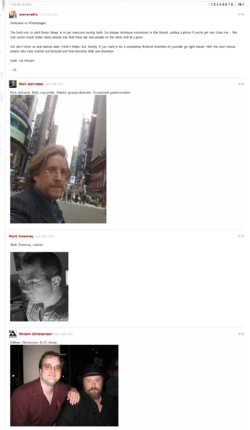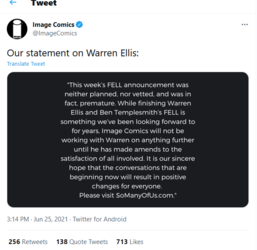Back in the day, I was briefly a member of the Warren Ellis Forum. I didn't hang around there for very long. It was incredibly cliquey - a cult of personality disorders - Ellis's and his hangers-on, many of whom were ghastly people, even then. In hindsight, you can see many of the problems that have bedevilled the comic book industry in recent years had their genesis in the febrile, piss-infused waters of that virtual geothermal pool.
Ellis was superficially charismatic. He had it in him to a be a cult leader. If he'd shaved off some of his remaining hair in an interesting way and put on some stripy robes, then the Ellisian techno cult would have been born, channelling articles from New Scientist into works of comic book fiction. Unfortunately for Ellis, a lot of his charisma was a front, papering over acres of self-doubt. Eventually he blinked, his magpie-eyed acolytes saw weakness and here we are.
Warren Ellis' following back in the late 90s and aughts was significant not so much because of Warren himself but the community that accreted around him, that he cultivated to have the stamp of his personality. I suppose what set it apart from the countless independent pleb comic and creators forums around the pre-social media internet was that the WEF community was one of the few, if not only comics-based online communities that had its own distinctive subculture. Not unlike Comicsgate today (which, regardless of what you may think Comicsgate's subculture actually is, we can all agree that it definitely exists).
And while the forums themselves were offlined over a decade ago, Internet Archive and Warren's very helpful encouragement for members to self-dox give a glimpse of who rubbed elbows in there:

web.archive.org

The Warren Ellis Forum wasn't just an online tool for comic creators to banter and barb; it was a breeding ground for the voices that would define the medium in the years to come. In this oral history from Joshua Rivera, a host of the forum's most activist participants discuss how one man and his…

web.archive.org
Image has quietly memoryholed this nostalgic tribute they made to the Warren Ellis Forum, which is unsurprising given their cancellation of Warren Ellis yesterday, but thankfully the internet never forgets. Here's a relation of the forum 10 years after its death by now prominent comic professionals and journos WEF alumni
Kelly Sue DeConnick, Kieron Gillen, Matt Fraction, Chip Zdarsky, Sam Humphries, Heidi MacDonald, Christopher Sebela and Bryan Lee O'Malley. Funniest reveal: Chip Zdarsky was the Nasser of the WEF community and it became an injoke for Warren to ban him from the forum.
MacDonald: Another very important thing is that 1999-2000 was the darkest night for the United States comic book industry in the postwar period. The lowest sales, the most companies going out of business, Marvel's firing hundreds of people, companies going under—it was a very dark, bleak cut.
Fraction: It was the moment that Western comics changed. And we knew something was happening, but we didn't know what it was. I remember people who, to this day, you will see still writing things saying women and children do not like comic books, period. And then, you go to Barnes & Noble on the weekend, and there's the women and children laid out like cordwood reading manga and buying $200 stacks of books. Fat fucking books.
Sounds familiar.
Zdarsky: A lot of times I just wish people could see what we were saying. It was nice to be able to have these conversations that were in the public, how people would be able to read them and participate if they're good. And it's not on me if they're bad and they get banned. These conversations are happening in private that could help people, as a resource, and it's just hidden away because you don't want the shitbags to come knocking at your door—because there's nobody to control the shitbags. Whereas Warren used to be able to control the shitbags.

But perhaps most interesting was Heidi MacDonald's very vague recollections of the demise of the community:
MacDonald: It was sad. We all wanted it to go on and on and on, but Warren was smarter than we, you know? It was our first taste of how you can't have nice things on the internet. There's not a place that's open where you can just wander in and listen to all these people talking about stuff and venting. I mean, I'm sure there was some bad stuff that I've forgotten and I blanked it in my mind, but in my memory, it was a wonderful paradise of the internet when the world was young.
Which contrasts strongly from MacDonald's explanation back in 2007 of why she left the WEF spinoff forum
The Engine to found
ComicsBeat (that very same den of cancel culture Comicsgate rages against today):
Goodbye, Engine

www.comicsbeat.com
(Image of forum e-thot with 'WARREN' carved into her skin helpfully provided by Heidi MacDonald)
From where we sit, The Engine was a mixed success. While there was much useful information and intelligent discussion, it was constantly competing with threads full of Ellis-ites posting silly pictures of themselves, such as the above, and the number of exhibitionistic young women who professed themselves surprised at the level of interest in naked pictures of themselves quickly became cloying, then annoying.
Frankly, while we admire Warren for his imagination and writing skills, his twin obsessions — TV shows and BME Goth girls posing topless — were often twin distractions from the real business at hands — COMICS! (Plus, those girls who were talking theoretical physics in one post and posing in their underwear in the next, clearly haven’t learned the fundamental law of human nature that when a woman is in her underwear, a man isn’t going to actually hear a word she has to say.)
I for one am inclined to believe this explanation over the blandishments MacDonald offered to Image a decade later - even without the convincing photo evidence, Heidi MacDonald's description of Ellis as a man who grew increasingly uninterested in comics, let alone leading the comics subculture he founded, as his attentions turned towards TV serials (and writing them) and cooming to goth girls on the internet definitely has the ring of truth to it. Especially given the trajectory of his career since 2007. A lesson to be learned for sure about a leader of a subculture, community, movement (at least in Heidi's eyes) or whatever you want to call it, who over time grew bored with his success, stagnated, took it and his community for granted, and the resulting decade-plus of seething, vengeful anger from the people that felt betrayed in his wake.
Thanks, Heidi






